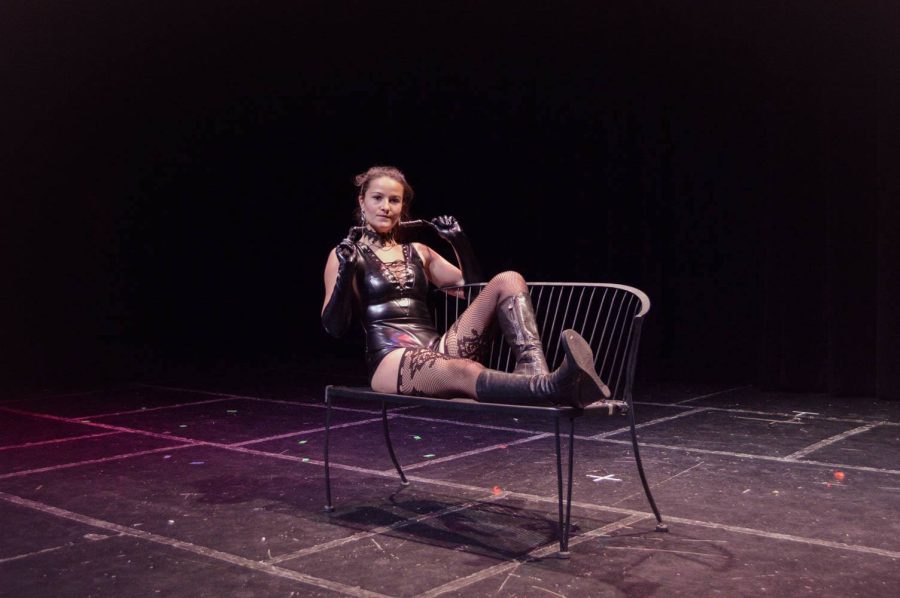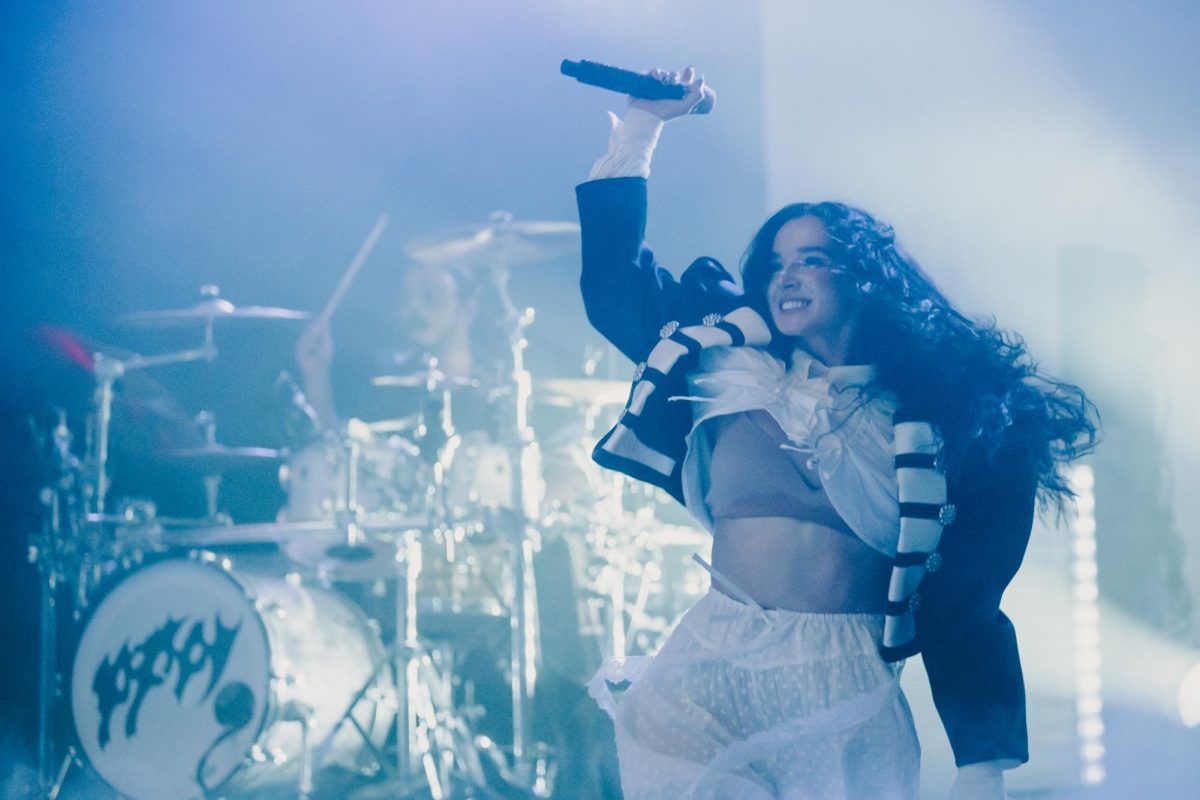With its controversial title and content, “The Vagina Monologues” is certainly a production laden with shock value. To many, “The Vagina Monologues’” feminism no longer seems relevant, spurring this year’s addition of “HerStories,” featuring UC San Diego student-written pieces that highlight the intersectionality of experience among women.
The UCSD Guardian sat down with this year’s directors, Miranda Barron, Lizzie Hodgdon, Wei Gordon, Rachel Sebastian and Janine Lopez, to learn more about “The Vagina Monologues” and “HerStories” along with their ongoing significance.
Guardian: What are “The Vagina Monologues” and “HerStories,” and why are they still relevant today?
WG: “The Vagina Monologues” is a collection of dialogues written by Eve Ensler in 1996, inspired by interviews with hundreds of women. “HerStories” represents a collection of stories written by UCSD students that we decided to infuse with “The Vagina Monologues” this year. This production is still relevant as long as there are people in the world who still question why “The Vagina Monologues” were created or exist.
LG: “The Vagina Monologues” is a more than 20-year-old theater show that began as interviews of women from many backgrounds. The show’s mission was to share the collective stories of these women and bring forth open discussion about these complex issues women and girls face. “HerStories” is a newer campaign built off “The Vagina Monologues” to present local stories and conflicts that may not have been fully addressed in the origin play. “HerStories” gives “The Vagina Monologues’” community a way of expressing shared, relevant experiences — especially on college campuses where issues students face are very different than most of the monologues’ topics.
MB: For me, “The Vagina Monologues” and “HerStories” are healing. It’s transformative. Each year I see growth of members of the cast and crew just over the course of a few weeks. It is an opportunity to bring to light the violence and oppression that women and girls may experience over the course of their lives. This is a community of individuals who recognize that these oppressive forces should not be normalized. I think this ties in with the show’s relevance as well. Whether it be from the original canon of monologues or the new, student-written pieces, the main theme rings true for those who see the show. And it’s not just limited to experiences of sexual assault or domestic violence; we have pieces about how awkward it is to confront your genitalia, periods, finding love in expected places and standing in solidarity for those who cannot always stand up for themselves.
LG: While there are certainly dated parts of “The Vagina Monologues,” the overall message and mission of the show remains steadfastly important to our inequitable society. As long as there is gender-based violence, sexism, sexual and domestic abuse, sex-slavery, female genital mutilation, honor killings or murders of trans women, this show will remain relevant and an essential part of the feminist agenda. First and foremost, V-Day (the campaign for ending gender-based violence started in response to “The Vagina Monologues”) is dedicated to ending violence towards women and girls. But to take this one step further, V-Day can and should be inclusive of the intersectional approaches to feminism. It is critical that “The Vagina Monologues” maintains its relevance by expanding on the topics raised and highlighting the voices of women persecuted not only for their gender identity and expression, but also their race, sexuality, religion, culture, socio-economic status, ability/disability, immigration status and other identities that play into the systemic oppressions of our society. It’s my hope, and that of many individuals in “The Vagina Monologues,” to foster more dialogue about these complex issues than ever before.
RS: “The Vagina Monologues” is a community, production and movement. We are a group of individuals with a variety of backgrounds, perspectives and thoughts who rise together. We are rising to raise voices, [tell] stories and catalyze dialogues on topics of sexuality, gender identity, and violence against women. We stand to promote love. If there are individuals who feel like their voices are silenced, “The Vagina Monologues” is still needed. Safe spaces to talk about things like sexuality, gender identity, misogyny, and empowerment need to exist for everyone. Until pussy really means power, we will continue rising.
What made you want to direct the production?
LG: I have stage managed the show for the past two years, and it has been a pivotal part of my college experience. I knew there were changes to the production that I wanted to see made, and I felt I could lead this group to make some of the logistical changes needed.
RS: Being a part of “The Vagina Monologues” has changed my life. I wouldn’t be the person I am today with it. I have learned what it means to unapologetically be myself, and that is something I will carry with me for the rest of my life.
MB: This is my fourth year being involved with “The Vagina Monologues” here at UCSD. This community has given me a space to grow and challenge myself during my college years. I wanted to come back this year behind the scenes to facilitate a meaningful and engaging experience for the new members. I wanted to see changes in the original pieces that I hadn’t seen before and to incorporate new pieces in such a way that they explore topics we’ve only ever covered in workshops during meetings. Also, as the director of community relations, I’m helping to usher onto our campus “The Mending Monologues” (aka, “The Penis Monologues”). It is a men’s response to “The Vagina Monologues” and delves into another perspective of relationship and gender-based violence that I wholeheartedly believe we need to see explored on this campus!
WG: “The Vagina Monologues” has been done on campus in the same manner for the past 17 years. After a close friend of mine told me that she wouldn’t come see me in the show because she didn’t feel that “The Vagina Monologues” were relevant anymore, I decided that it was time to facilitate change in this production by providing students with an outlet to be heard and incorporating prevalent topics that were not previously discussed by Eve Ensler’s original monologues.
“The Vagina Monologues” helped me realize that what I want to do with my life is help victims of domestic violence and sexual assault; I’m continuing my education in psychology and gaining experience working as a behavioral therapist. I had the opportunity to apply last year, and I really want to give back to this community as much as I can.
What is your favorite part of being director this year?
WG: I love getting to meet so many cool, inspiring people through this organization, and I love leading change through “HerStories” with my fellow directors.
RS: Being able to see tangible changes with the addition of “HerStories.”
LG: My favorite part about being part of this community, because I don’t feel as much of a director as I am a mentor, is hearing everyone’s stories and different backgrounds. It has been a privilege to know these individuals and see their growth over the last few months. Finding your “place” in college can be tough, especially when you are still figuring out your own identity, but I feel many members learn a lot from our workshops and discussions. I hope everyone walks away feeling supported and empowered to keep doing meaningful work for their own communities.
MB: My absolute favorite part of being a director is being in the wings during performances. To see the vision that each actor had for their piece come to life is so humbling and exciting. We as directors say that this show is like our baby. So I feel like a mother who’s watching their child’s dance recital or sports event. I can’t stop smiling, my heart races a bit from when I first see them step out, and that energy they produce from the stage carries on with them when they step off. These performances really demonstrate the actors’ growth as individuals, and I could not be more proud of each and every one of them.
Why should people come see the show?
WG: To hopefully feel empowered or challenged, to learn something new, to see things in different perspectives and/or to spark new dialogues between people or within oneself.
LG: I think every member of the audience takes away a unique perspective on some topic that they haven’t had an opportunity to think deeply about. There is so much to learn from listening to people’s experiences. I truly believe that the only way we can continue to better society and achieve equity is to listen and act compassionately toward one another. I hope that our audience recognizes that despite some contentious issues we present, these stories are inspired by human experience, the desire to live a life without fear of violence and the opportunity to receive and share love. This could not be more perfectly summed up than [through] our last line of the show: “Go ahead, love.”
MB: Even if you’ve seen the show in past years, it’s never the same. It’s funny because my mom actually sees the show each and every night since I first started in the production.
This show is about more than a theatrical experience. It is standing in solidarity with those who have experienced violence, donating to two incredible organizations that help victims of sexual assault and domestic violence and refusing to accept these as normal life experiences. Because it’s not normal, it shouldn’t be. No one deserves to feel unsafe in their bodies and in their homes.
I think if you feel like you would hate the show or that you wouldn’t agree with the overall message that it is especially important that you come out and see it, because education and exposure are the first steps to ending violence. That’s what this show is all about.
RS: To laugh, cry and to love vaginas!
“The Vagina Monologues” and “HerStories” at UCSD were performed this weekend and the previous weekend. All proceeds went to two local non-profits dedicated toward ending domestic violence for all, License to Freedom and Break the Silence Against Domestic Violence.
Image Courtesy of “Vagina Monologues” Facebook








